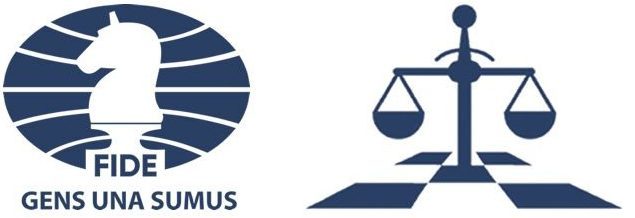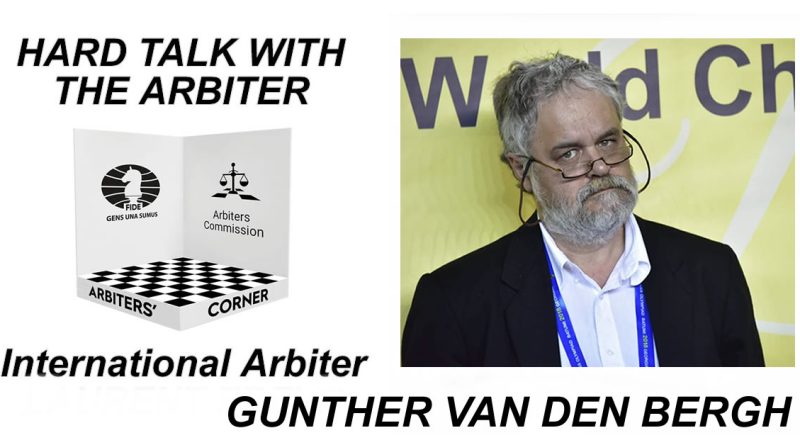HARD TALK WITH THE ARBITER – IA GUNTHER VAN DER BERGH
Hard Talk with the Arbiter continues introducing International Arbiter Gunther van der Bergh from South Africa.
1. Who is Gunther Van Den Bergh? Can you share your background and experience as an arbiter?
I live on a plot (small farm) in Port Elizabeth (South Africa). I have studied mathematics, statistics and electrical engineering. I have been a teacher for 10 years at a private school where I taught mathematics, physics and chemistry to high school students. During the day I like to keep myself busy with growing my own vegetables using various hydroponic systems (my specialty being super-hot chilies), developing software (I’m a programmer) and solving problems using game theory (but this is more of a hobby). Currently I’m the Ratings Officer for Chess South Africa as well as the Chairperson of our Arbiters & Organizers Commission.
I started my arbiter career when I entered high school. We had a very small club and I noticed there was a need for “refereeing” and running & organizing tournaments. It also irritated me that we had to do pairings by hand (we used cards to do the job) and eventually wrote my own pairing software (the first version was not very good but was good enough to do the job back then). In the early 1990’s I joined our local club (Port Elizabth Chess Club) and seriously started getting involved with arbitrating and organizing events. I wrote the IA exam in 2003 during the All-African Games in Abuja Nigeria (back then the FA title did not exist) and qualified as International Arbiter in 2005. I’ve been appointed as Chief Arbiter at countless events in Africa and have also been Match Arbiter at many Olympiads.
Currently I’m an International Arbiter (Category A) and FIDE Lecturer. I love giving lecturers (both face-to-face and online) and it gives me great satisfaction to share knowledge with others and see them grow. I strongly believe that the younger generations should be empowered to eventually take over one day (I will not be around forever).
i speak Afrikaans (my mother tongue), am fluent in English and also speak Dutch, German and Russian (the latter two I need to brush up on).
2. What do you enjoy most about being an arbiter (Chief Arbiter)?
Everything. I like to be involved with as much as possible but being careful not to do the job of others (stick to what I’m supposed to do but always assist where possible) or step on anyone’s toes. Regardless if I’m Chief Arbiter or not, I always make a point of learning from other arbiters – some have very good ideas and practices on ensuring the smooth running of events. I “steal” these ideas and use them when I conduct my next events. I believe that no arbiter will always know everything and run a perfect event, you must cooperate with and learn from other arbiters and this is the only way you will grow as a person.
I believe that no arbiter will always know everything and run a perfect event, you must cooperate with and learn from other arbiters and this is the only way you will grow as a person.
Gunther Van Der Bergh
3. Can you walk us through the process of organizing and conducting a chess tournament from the perspective of a chief arbiter?
As mentioned in the previous point, I apply what I have learned from others over the years. My very first few events (as Chief Arbiter) were shaky and I made a lot of mistakes but have learned from this. There is much to do: before, during and after the event. I have not recently organised events but rather assist in the process. We have a couple of excellent event organisers which makes my (or any other CA’s) job/life easier. No worries about the venue, equipment, etc. – all done and sorted by excellent skilled persons. My main concern is to ensure the correct number and mix of arbiters are appointed. Our AOC (Arbiters & Organisers Commission) make the appointments for national events via an application process (very similar to what ARB does). During the event I ensure that all arbiters do what they are supposed to be doing. I dont police anyone and dont believe in running a dictatorship at events. I let arbiters do their job and assist where I see help is needed. It is better to create a pleasant environment where everyone can work together (as mates) rather than alienating everyone and not enjoying the event. I like to delegate certain “jobs” to arbiters on a rotational basis so that everyone can be part of all aspects of the event as much as possible. This way it is easy to determine which arbiters are all-rounders, who is good at certain jobs only and who needs more training and guidance. After the event it is just the basic wrap-up, ensuring results are submitted for rating, etc., etc. I always encourage other arbiters to refer to the arbiter’s manual and spot where we made mistakes, where we can improve, what we did well, etc.
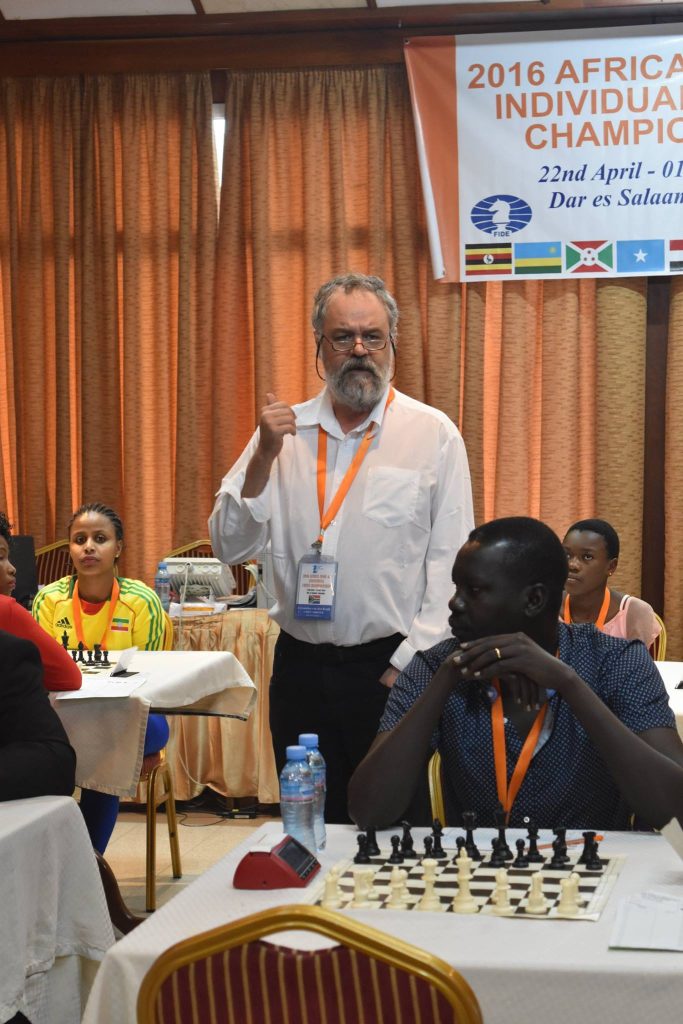
4. You are one of the celebrated arbiters in Africa. What advice would you give to upcoming arbiters to reach your level?
Be patient and work hard. Rome was not built in one day. Learn and work with others. Be as active as possible – assist at as many events as you can. Be dedicated. Learn as much as you can. Accept disappointments (not being appointed to certain high-level events) – it is all part of the process. Celebrate other’s achievements (its not just all about you). Do not give up – eventually you will make it.
5. Do you see yourself one day to be a Chief Arbiter for the World Chess Olympiads? If yes, what qualifications or skills do you believe are essential for someone to officiate at the highest level such as the Chess Olympiads or World Championships?
I have dreamt of this many times and really hope I will get that appointment one day. I am ready – I see it as a challenge and the pinnacle of any arbiter’s career. The CA should be completely objective, have very good leadership skills, can work with people and of course know and apply the laws. In other words, be totally professional. I believe in being a leader and not a boss. I have found that many arbiters, although good, are afraid of accepting this role. Experience plays a big part. I strongly believe that you need to rise through the ranks and show your worth. Being appointed as CA for the Olympiad or World Championships will be the greatest honour for any arbiter as I believe this shows that you are respected in many ways.
6. How do you handle situations where there is a discrepancy between your interpretation of the rules and that of other arbiters?
I always listen to the other arbiter(s). We are human and do make mistakes and I accept that I could be wrong. That is why I always engage in debate regarding the Laws etc.
In South Africa we have a WhatsApp group for arbiters where we exchange ideas, post puzzles related to the Laws, debate about things, etc. If I know I’m correct I will engage with the other arbiter and carefully explain my line of thought and why he/she is wrong. And I expect them to do the same if I have erred.
7. What do you think are the biggest challenges facing arbiters today?
This is a difficult one. What I have noticed is that many arbiters do not keep themselves up-to-date with the latest changes to the Laws as well as other regulations. Also, many arbiters do not get sufficient opportunity to further their careers. This is a big problem in Africa as there are several good arbiters that need more exposure at international events. I have worked with many of them. Some need IA norms, others need a chance to up their category status.
A continuous debate we have is: do you create more arbiters with a few norms or do you concentrate on a few only and ensure they qualify as FA/IA. It is a balancing act. There are many things to consider. Unfortunately, you cannot satisfy everyone and there will be some arbiters that will be disadvantaged.
8. Can you describe any habits you have before or during a game to help you stay focused?
Before any event (regardless of its status) I always read through the Laws again. And make sure I have a good supply of coffee. Other than that, I just try to enjoy myself as much as possible.
9. Can you share any experiences where you had to collaborate with other officials or review decisions together?
One instance that comes to mind happened at an event a few years ago (I was not an arbiter at this event). A player appealed the decision of the arbiter and the appeals committee overturned the ruling of the arbiter and awarded more points to the game than was allowed. During the same event there were rumours that the parings looked very funny. A panel (consisting of 3 IAs, including myself) was formed to investigate both matters. We found that the appeals committee erred in their decision and that there was indeed manipulation of the pairings. This case went to national level and eventually the results of the event was declared null and void.
At another event (a very long time ago) I was asked to solve a situation in a game. This was a very difficult case and it was one of the few instances where I had absolutely no idea what to do. I consulted my Deputy arbiters and the chief organiser and together we found the solution. The case (sort of) made headlines nationally but I just cannot recall the exact details. I do save all my incident reports but its most likely stored on one of my many hard drives and will take me ages to find.
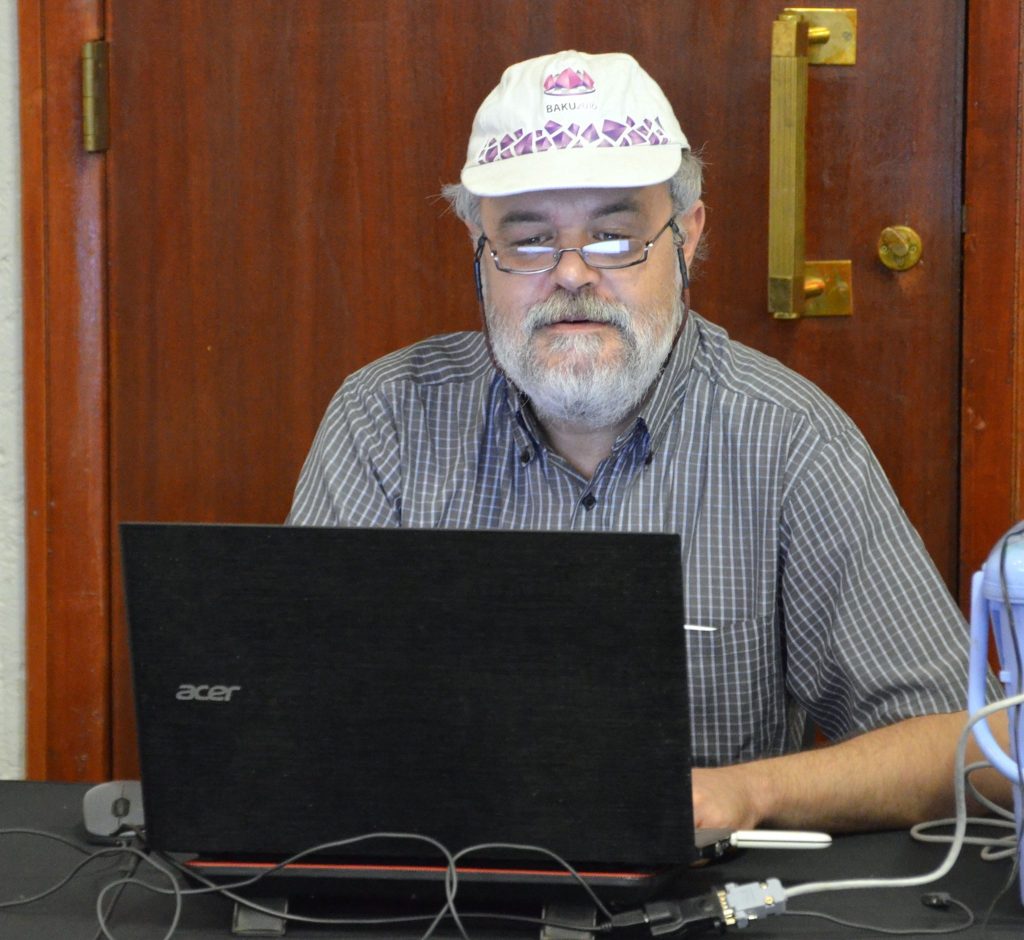
10. Can you describe a time when you had to make a tough judgment call? How did you approach it?
I can clearly recall two specific incidents. They were not difficult but rather heartbreaking as I felt sorry for the players I had to rule against.
The first was during the 2014 Olympiad in Tromso. I was arbiter for the match Uganda vs Yemen (if I recall correctly). The Ugandan was about to checkmate his opponent but his flag fell (which I saw) and I had to intervene. The poor player was very close to tears. A few words of encouragement afterwards made him feel somewhat better.
The second happened during the 2014 World Youth Championships in Durban. In the last round there was an incident about a 3-fold repetition of position. White was claiming the draw. Black needed to win to secure a medal position. To make a long story short, I eventually declared the game drawn. Black appealed and the Appeals Committee took more than 4 hours to make their ruling (upholding my decision). This case even went to FIDE who also agreed with the draw ruling. I felt very bad for Black but knew my ruling was correct.
11. Can you walk us through your decision-making process when making a critical call during a game?
I always apply the following 3 “main” principles when making a call (something I always teach students during a seminar): (a) Strict order of events, (b) possibility over probability, and (c) use common sense. With these here points you can solve nearly every problem. I always give both players a chance to speak and make very sure I understand both correctly. 99% of the time it is abundantly clear what happened and what the ruling should be (even though the players have not yet completed telling their sides of the story). I always think of past incidents from other arbiters who handled similar cases, to guide my decision making.
I then carefully and respectfully explain to the players how and which article(s) is/are applicable and then make my ruling accordingly. An arbiter should make his ruling confidently and as quickly as possible – this garners respect from players and other arbiters, something which I think is very important when conducting events. Always listen to players and let them speak even if you know they are wrong or misunderstand something.
An arbiter should make his ruling confidently and as quickly as possible – this garners respect from players and other arbiters, something which I think is very important when conducting events.
Gunther Van Der Bergh
12. Have you ever faced criticism or backlash for a decision you made during a game? How did you handle it?
Many times. I always allow the other party to “say their say” and then explain my ruling and why I did so and always show them the relevant articles in the Laws that I based my decision on. I never tell them they are wrong, I rather say “the law states the following” and then show them. Always keep calm, it breaks the tension very quickly.
13. As a FIDE Lecturer, I have observed that you always start with these three points:
- Possibility always takes preference over probability
- Strict order of events
- Use common sense
Why do you always start with these three points and why are they important? Can you fully explain them?
If you apply at least one of these points to any situation arising in a game, you will basically always solve the problem. I drill this into students. During a lecture and before starting with the Laws, I always emphasize these points and continuously do so throughout the lecture, especially when we discuss practical examples. When confronted with a problem, students tend to guess the answer (not yet fully understanding the laws) but when I tell them to apply one of these points, they suddenly realize what the issue is and can solve the problem. It gives me great joy to see their faces light up when they actually grasping the essence of the Laws.
When explaining these points, I always use the following “silly” examples. They get the point across.
- Look at any lotto. It is possible to win the jackpot (there has been many winners before) but the likelihood of doing so still exist regardless of how small the possibility is (otherwise it would have been a scam). In a game when a flag has fallen it does not mean that player automatically loses the game, you need to check if the opponent can still win with any series of legal moves, does not matter how stupid these moves are. If there exist a series of legal moves (regardless of how absolutely stupid these moves might be) that will lead to a checkmate (a helpmate) then the opponent wins otherwise the game is drawn. I then set up a random position and let the students play the game out (I pretend to be the player who lost on time and make silly moves and they must try to checkmate me). This is always fun and they grasp the point quickly.
- When dealing with an issue, always determine the exact order of what happened. A happened first, then B, then C, etc. Once this is established you can easily determine which article of the Laws should be applied. This is especially helpful when dealing with a touch move issue where more than one piece was touched. Example: when a player touches his piece and that of his opponent, first determine which piece was touch first, then what other pieces were touched next, etc. Once the students understand this point, I give them a couple of other examples which they then solve easily.
- Sometimes you will have an issue that is not covered by the laws. This usually involves some practical solution. Here I let students come up with issues that might arise during an event – this part is also fun (very imaginative suggestions are made which is sometimes hilarious).
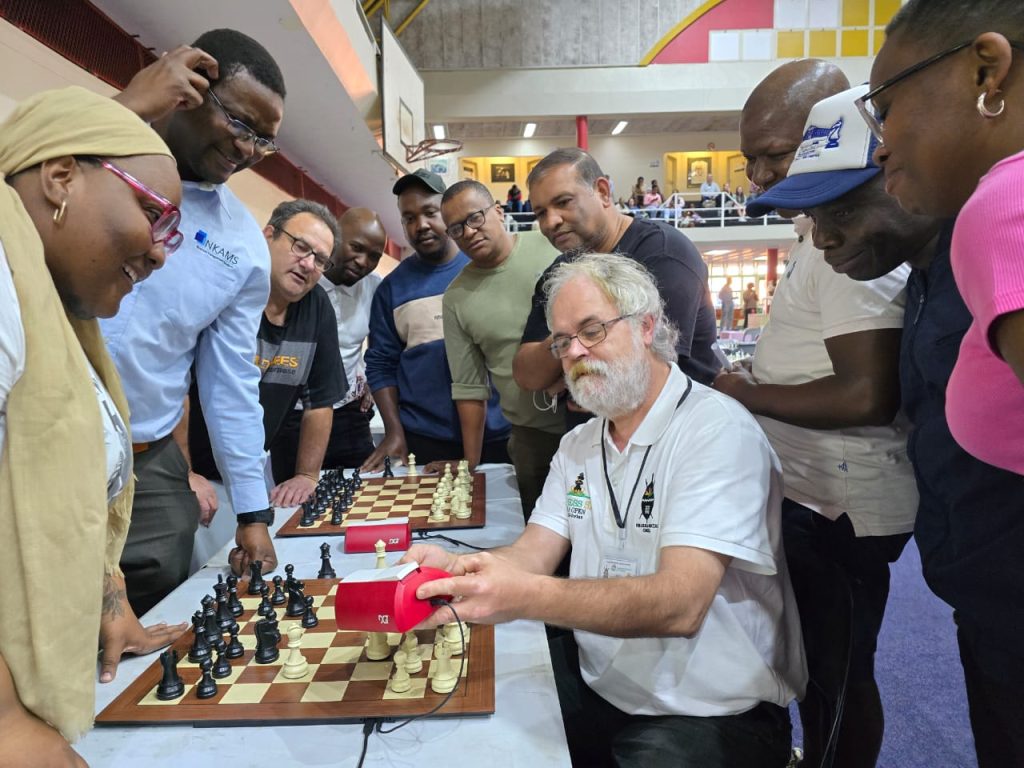
14. As a FIDE Arbiter Lecturer, which has been the most topic your students fail and why do they fail it?
Pairings and Tiebreak calculations. When explain these topics, I always start with very basic examples just to show the basic principles. Then gradually the examples become more difficult. I use an excel sheet when explaining pairings. The first example only includes how colours are allocated and how to pair players in a score group (ignoring all floats, rankings, etc.). Then gradually I add “you must first sort the players”, then “ok, this player had a down-float in the previous round”, etc. Then how do we split the players into two groups to start making the pairings. Then when we do a very difficult example it is as if everything we have done so far is forgotten. Then we start all over again. Same goes with tiebreaks. We start off with very basic examples and gradually increase the difficulty.
Courses need to be at least 20 hours. I have found that most failures occur during face-to-face seminars as everything needs to be covered over a few days (usually 2 or 3 days). This does not give students enough time to “study” pairings and tiebreaks. Online seminars are totally different – here I like to spread out the seminar, usually over 3 weekends. Then I can spend more time (sometimes half a day) just on pairings and tiebreaks and do many examples. Students then have more time to practice these examples (homework). I like to use actual tournaments for homework. E.g., I will randomly pick a tournament from chess-results, display the standings after (say) round 3 and ask the candidates to manually calculate the pairings for round 4. The next day we will go over their answers and see if they can duplicate the pairings produced by Swiss Manager and where (and why) they made mistakes (if any). I have had very few candidates failing pairings and tiebreaks when conducting online seminars.
15. In conclusion, what problems as an arbiter (Chief Arbiter) did you face in your last chess event and how did you solve it?
I have not recently experienced any “stand-out” issues. Most of them are things that require practical solutions and really has nothing to do with the Laws or running of the event itself. One incident (that ties in with the previous point) that comes to mind happened: during the South African Open Championships in Cape Town a few years ago. The “coffee room” (for arbiters and organisers) was located a few meters from the entrance to the main playing hall. The last person to make coffee did not switch the kettle off and the steam generated set off the building’s fire alarm (a very loud beep-beep sounded and a pre-recorded voice instructed everyone to immediately leave the building). My first instruction to players were to stop their clocks, leave everything on their tables and orderly exit the playing hall. Everyone was gathered outside the building and it is obvious that you cannot control 200+ people that are scattered all over the place. I was heavily criticized for not ensuring that people were not chatting to each other.
Be patient and work hard. Rome was not built in one day. Learn and work with others. Be as active as possible – assist at as many events as you can. Be dedicated. Learn as much as you can. Accept disappointments (not being appointed to certain high-level events) – it is all part of the process. Celebrate other’s achievements (its not just all about you). Do not give up – eventually you will make it.
Gunther Van Der Bergh
Prepared by IA Chanda Nsakanya
